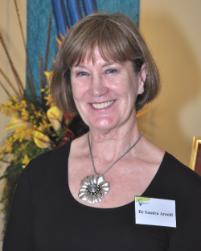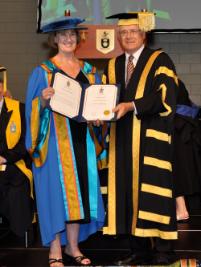Challenging our 'death denying' society
Published on 20 September, 2010
PhD graduate Sandra Arnold spent the days before her recent graduation ceremony cleaning up her house after the Christchurch earthquake but she had already come to terms with her own more personal tragedy.
Sandra's daughter was diagnosed with cancer at age 22 and died at age 23, so it was a tender experience to tackle a thesis entitled 'Sing no sad songs: Grieving the death of a young adult child from cancer'.
"My creative nonfiction memoir project helped me to look at areas that had been previously unimaginable... I had been forced through a sort of catharsis as I was writing because I tend to make sense of my world through my writing," Sandra said.
She contextualised her creative work within the findings of psychological and sociological theories of grief, the language of grief and story telling.
"It was a topic I could not speak about but which I wrote about.
"I found it was a topic which was not greatly known because it's about 18-25 year old adults and, while there's quite a lot written about children dying and cancer in children, there's very little about cancer in young adults.
"I found it was going to be cathartic for me personally but I thought it would also be cathartic for other people who have gone through the same situation and who like me had been bookshops to try to make sense of what they have gone through, but found very little."
Sandra said her project examined how parental bereavement is handled in western societies, "which is not very well at all".
"We tend to be quite a death-denying society and there's a lot of taboos on talking about bereavement and death, especially when it's a child, because no-one expects a child to die."
Sandra has published her work in a journal and hopes to have part of it published in a book. She thanks Associate Professor Wally Woods and Dr Lynda Hawryluk from CQUniversity for their supervision and assistance.



